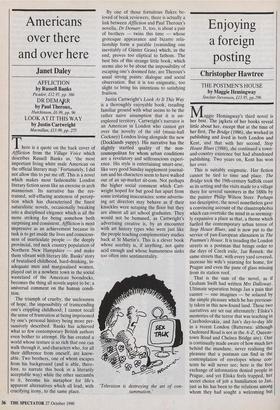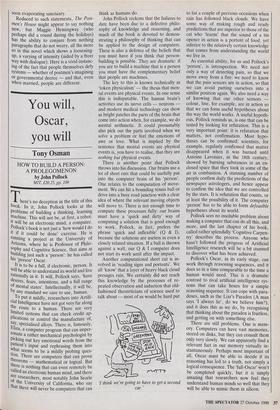Enj oying a foreign posting
Christopher Hawtree
THE POSTMEN'S HOUSE by Maggie Hemingway
Sinclair-Stevenson, £13.95, pp.296
Maggie Hemingway's third novel is her best. The jackets of her books reveal little about her, except that at the time of her first, The Bridge (1986), she worked in publishing and lived in both London and Kent, and that with her second, Stop House Blues (1988), she continued a town- and-country existence but had abandoned publishing. Two years on, Kent has won her over.
This is suitably enigmatic. Her fiction cannot be tied to time and place. The Bridge took the 19th-century Suffolk coast as its setting and the visits made to a village there for several summers in the 1880s by the painter Philip Wilson Steer. Perhaps too descriptive, the novel nonetheless gave a convincing account of the claustrophobia which can overtake the mind in as seeming- ly expansive a place as that, a theme which fuelled the contemporary urban terror of Stop House Blues, and is now put to the service of pan-European alienation in The Postmen's House. It is treading the London streets as a postman that brings order to the days of Czech exile, Jan Remek: the same streets that, with every yard covered, increase his wife's yearning for home, for Prague and even the pane of glass missing from its station roof.
That is the sum of the novel, as if Graham Swift had written Mrs Dalloway. Ultimate separation brings Jan a pain that cannot — one imagines — be solaced by the simple pleasure which he has previous- ly taken in this new-found land. These two narratives are set out alternately: Eliska's memories of the terror that was teaching in Czechoslovakia, and Jan's day-to-day life in a recent London (Battersea: although Oudenard Road is not in the A-Z, Queens- town Road and Chelsea Bridge are). One is continually made aware of how much lies behind the mundane, never realising the pleasure that a postman can find in the contemplation of envelopes whose con- tents he will never see; here is the free exchange of information denied people in Prague, and yet Eliska feels trapped, her secret choice of job a humiliation to Jan, just as his has been to the relations among whom they had sought a welcoming but soon evaporating sanctuary. Reduced to such statements, The Post- men's House might appear to say nothing new, but Maggie Hemingway (who perhaps did a round during the holidays) has the ability to conjure from nothing paragraphs that do not weary, all the more so in this novel which shows a loosening- up, a varying of intensity (aided by a freer way with dialogue). Here is a vivid instanc- ing of the fact that people themselves defy systems — whether of postmen's imagining or governmental decree — and that, even when married, people are different.



































































 Previous page
Previous page